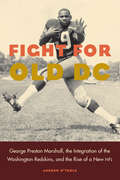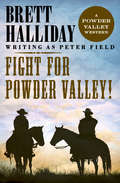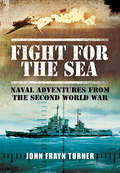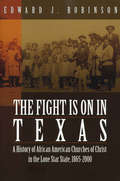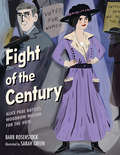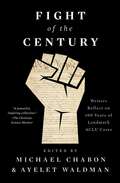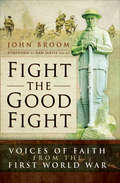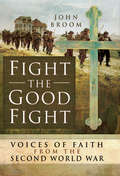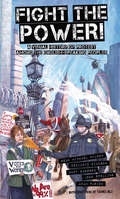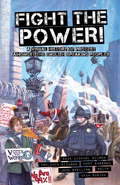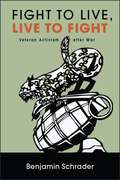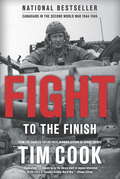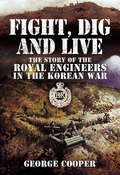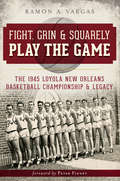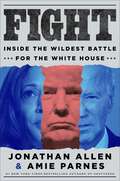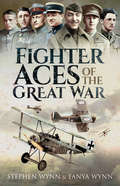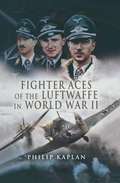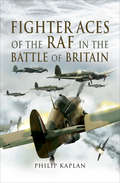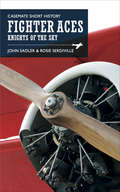- Table View
- List View
Fight for Old DC: George Preston Marshall, the Integration of the Washington Redskins, and the Rise of a New NFL
by Andrew O'TooleIn 1932 laundry-store tycoon George Preston Marshall became part owner of the Boston Braves franchise in the National Football League. To separate his franchise from the baseball team, he renamed it the Redskins in 1933 and then in 1937 moved his team to Washington DC, where the team won two NFL championships over the next decade. But it was off the field that Marshall made his lasting impact. An innovator, he achieved many “firsts” in professional football. His team was the first to telecast all its games, have its own fight song and a halftime show, and assemble its own marching band and cheerleading squad. He viewed football as an entertainment business and accordingly made changes to increase scoring and improve the fan experience. But along with innovation, there was controversy. Marshall was a proud son of the South, and as the fifties came to a close, his team remained the only franchise in the three major league sports to not have a single black player. Marshall came under pressure from Congress and the NFL and its president, Pete Rozelle, as league expansion and new television contract possibilities forced the issue on the reluctant owner. Outside forces finally pushed Marshall to trade for Bobby Mitchell, the team’s first black player, in 1962. With the story of Marshall’s holdout as the backdrop, Fight for Old DC chronicles these pivotal years when the NFL began its ascent to the top of the nation’s sporting interest.
Fight for Powder Valley! (The Powder Valley Westerns #16)
by Brett HallidayFor the sake of cheated settlers, Sheriff Pat Stevens takes on a Powder Valley conman On a weather-beaten stretch of the Kansas prairie, a family fights to survive. Molly Hartsell is only twenty-seven, but years of barely scraping by have made her old before her time. Her children are frail, tired, and hungry. If something doesn't change soon, the Hartsells are doomed. But Molly's husband returns from the bank with good news: He sold the farm and invested every penny in property far away in Colorado's lush Powder Valley. It's a new start for the Hartsells, but it turns out their troubles are just beginning. When the Hartsells arrive in Powder Valley and discover they were sold a bill of false goods, it seems as if the family is ruined. But Sherriff Pat Stevens--with the help of his loyal friends Sam and Ezra--will fight tooth and nail to defeat the crooked swindlers and make sure everyone in town can call Powder Valley their home.
Fight for the Air: Aviation Adventures from the Second World War
by John Frayn TurnerThis collection of popular air warfare stories covers the entire span of World War II, beginning when the Royal Air Force faced fascist forces on its own until the dropping of the Atomic bombs on the Japanese in 1945. Fight for the Air offers a rich mixture of accounts about such large and well-known battles and operations as the Battle of Britain, the huge Allied bomber raids over German cities, as well as more specialist operations such as the Dambusters. Individual feats of courage make for inspiring reading. The author's prose crackles with action and tension and his deep understanding of air warfare is obvious.These short stories give the reader an understanding of the global scope of air operations and their massive contribution to ultimate victory.
Fight for the Sea: Naval Adventures from the Second World War
by John Frayn TurnerThis collection of popular naval stories covers the entire span of World War II, beginning when the British Royal Navy faced fascist forces on its own until the final Allied victory over the Japanese in 1945. Fight for the Sea offers a rich mixture of accounts about such large and well-known battles and operations as the Battle of the Coral Sea, as well as lesser-known actions such as the submarine attack on Corfu harbour, the loss of the USS Leedsdown, and the saga of the USS Rich to characterize the breadth and variety of the war at sea. Also included are memories of John F Kennedy's heroic actions with PT 109 and George H W Bush's near-death experience with an aircraft known as the 'flying casket'.A sailor's eye view of the war at sea, this compelling compilation has broad appeal. John Frayn Turner's prose crackles with action and tension to keep the reader's attention, and even those who know little about the war will find the stories to be a welcome introduction to the subject. Among the book's special attractions are the little-known contributions of rescue ships and merchant seamen and the adventures of civilians, including Johnnie Ferguson, who spent three weeks adrift in an open boat when her ship was torpedoed. Readers will come away with not only a clear understanding of the giant scope of World War II but of the individual grit and determination that produced victory.
Fight for the Sky: The Story of the Spitfire and Hurricane
by Douglas BaderThe only book written by the legendary &“legless&” ace, the double amputee World War II fighter pilot immortalized by the film Reach for the Sky. In Fight for the Sky, Douglas Bader tells the inspiring story of the Battle of Britain from the viewpoint of &“The Few.&” Using superb illustrations he traces the development of the Spitfire and Hurricane and describes the nail-biting actions of those who flew them against far superior numbers of enemy aircraft. As an added bonus, other well-known fighter aces including Johnnie Johnson, &“Laddie&” Lucas and Max Aikten contribute to Douglas&’s book, no doubt out of affection and respect. This a really important contribution to RAF history by one of the greatest—and certainly the most famous—pilot of the Second World War.
Fight is on in Texas, The: A History of African American Churches of Christ in the Lone Star State, 1865-2000
by Edward J. RobinsonThis groundbreaking work draws upon congregational histories and other primary sources to chronicle for the first time the story of African American Churches of Christ in Texas. Emerging out of the nineteenth-century Stone-Campbell Restoration Movement, the African American churches inherited from their white mentors both a biblicist theology and a feisty spirit. So evangelist John T. Ramsey could report in 1916 that 'there are but few loyal brethren out in this part of Texas; so you can see that the fight is on out West.'The "fight" waged by leaders in African American Churches of Christ was against religious error. Out of that "fight" emerged a growing network of congregations that have reached throughout Texas. This book lifts out of obscurity the African American Christians who joined Ramsey's 'fight...out West' and who made black churches of Christ in Texas what they are today.
Fight of the Century
by Barb RosenstockThe fight for women's suffrage between women's rights leader Alice Paul and President Woodrow Wilson is creatively presented as a four-round boxing match in this energetic nonfiction picture book.When Woodrow Wilson was elected President, he didn't know that he would be participating in one of the greatest fights of the century: the battle for women's right to vote. The formidable Alice Paul led the women's suffrage movement, and saw President Wilson's election as an opportunity to win the vote to women. She battered her opponent with endless strategic arguments and carefully coordinated protests, calling for a new amendment granting women the right to vote. With a spirit and determination that never quit--even when peaceful protests were met with violence and even when many women were thrown in jail--Paul eventually convinced President Wilson to support her cause, changing the country forever. Cleverly framed as a boxing match, this book provides a fascinating and compelling look at an important moment in American history. Sarah Green's bright, detailed illustrations perfectly accompany award-winning author Barb Rosenstock's captivating narrative.
Fight of the Century: Writers Reflect on 100 Years of Landmark ACLU Cases
by Neil Gaiman Dave Eggers Scott Turow Salman Rushdie Michael Cunningham Louise Erdrich Geraldine Brooks David Handler Andrew Sean Greer Ann Patchett Meg Wolitzer Elizabeth Strout Timothy Egan Jonathan Lethem Rabih Alameddine Lauren Groff Victor Lavalle Jennifer Egan Aleksandar Hemon Anthony Doerr William Finnegan Jesmyn Ward George Saunders Marlon James Viet Thanh Nguyen Yaa Gyasi Brit Bennett Morgan Parker Moriel Rothman-Zecher Sergio De La Pava Jacqueline woodson Steven Okazaki Li Yiyun Hector Tobar Moses Sumney C.J. Anders Brenda J. Childs Adrian Nicole LeBlancThe American Civil Liberties Union partners with award-winning authors Michael Chabon and Ayelet Waldman in this &“forceful, beautifully written&” (Associated Press) collection that brings together many of our greatest living writers, each contributing an original piece inspired by a historic ACLU case. On January 19, 1920, a small group of idealists and visionaries, including Helen Keller, Jane Addams, Roger Baldwin, and Crystal Eastman, founded the American Civil Liberties Union. A century after its creation, the ACLU remains the nation&’s premier defender of the rights and freedoms guaranteed by the Constitution. In collaboration with the ACLU, authors Michael Chabon and Ayelet Waldman have curated an anthology of essays &“full of struggle, emotion, fear, resilience, hope, and triumph&” (Los Angeles Review of Books) about landmark cases in the organization&’s one-hundred-year history. Fight of the Century takes you inside the trials and the stories that have shaped modern life. Some of the most prominent cases that the ACLU has been involved in—Brown v. Board of Education, Roe v. Wade, Miranda v. Arizona—need little introduction. Others you may never even have heard of, yet their outcomes quietly defined the world we live in now. Familiar or little-known, each case springs to vivid life in the hands of the acclaimed writers who dive into the history, narrate their personal experiences, and debate the questions at the heart of each issue. Hector Tobar introduces us to Ernesto Miranda, the felon whose wrongful conviction inspired the now-iconic Miranda rights—which the police would later read to the man suspected of killing him. Yaa Gyasi confronts the legacy of Brown v. Board of Education, in which the ACLU submitted a friend of- the-court brief questioning why a nation that has sent men to the moon still has public schools so unequal that they may as well be on different planets. True to the ACLU&’s spirit of principled dissent, Scott Turow offers a blistering critique of the ACLU&’s stance on campaign finance. These powerful stories, along with essays from Neil Gaiman, Meg Wolitzer, Salman Rushdie, Ann Patchett, Viet Thanh Nguyen, Louise Erdrich, George Saunders, and many more, remind us that the issues the ACLU has engaged over the past one hundred years remain as vital as ever today, and that we can never take our liberties for granted. Chabon and Waldman are donating their advance to the ACLU and the contributors are forgoing payment.
Fight the Good Fight: Voices of Faith from the First World War
by John Broom&“The inspiring stories of a number of very different characters who used their Christian faith to cope with their experiences of the First World War.&” —Jacqueline Wadsworth, author of Letters from the Trenches While a toxic mixture of nationalism and militarism tore Europe and the wider world apart from 1914 to 1919, there was one factor that united millions of people across all nations: that of a Christian faith. People interpreted this faith in many different ways. Soldiers marched off to war with ringing endorsements from bishops that they were fighting a Godly crusade, others preached in churches and tribunal hearings that war was fundamentally against the teachings of Christ. Whether Church of England or Nonconformist, Catholic or Presbyterian, German Lutheran or the American Church of Christ in Christian Union, men and women across the globe conceptualized their war through the prism of their belief in a Christian God. This book brings together twenty-three individual and family case studies, some of well-known personalities, others whose stories have been neglected through the decades. Although divided by nation, social class, political outlook, and denomination, they were united in their desire to &‘Fight the Good Fight.&’ &“John Broom looks at such beliefs during the first world war—the Tommies were always fighting for God, the king and their country . . . a fascinating study.&” —Books Monthly &“A detailed study of a usually hidden aspect of wartime social history, the topic of Christian faith. Fight the Good Fight has been meticulously researched and includes a wealth of previously unpublished material.&” —Come Step Back In Time
Fight the Good Fight: Voices of Faith from the Second World War
by John BroomThe Second World War challenged many of the concepts that had provided stability and unity in the world. As totalitarian regimes in Europe and Asia attempted to impose their world view on their neighbours, a struggle for what Winston Churchill described as `Christian civilisation took place on many fronts. On the home front, on land, on sea and in the air, as well as in the horrific concentration camps of Europe and prisoner of war camps in the Far East, people of a Christian faith found their beliefs challenged. However, for many this challenge provided an affirmation of that faith, as it provided a rock amidst the ever shifting sands of circumstance. This book contains the accounts of twenty such individuals, many drawn from previously unpublished sources. Their testimonies provide evidence that during a time of discord, disruption, dislocation and death, the Christian faith remained a key force in sustaining morale and a willingness to fight the good fight.Interesting Facts King George VI called National Days of Prayer during Britains darkest days in 1940Had Michael Benn survived the war, he would have become the 2nd Viscount Stansgate, meaning his brother, Tony, would not have had to fight to renounce his peerageBill Frankland avoided near certain death at the Alexandra Hospital Massacre by the toss of a coinStanley Warren only found out about the rediscovery of his Changi Murals during a chance work conversation in the 1950sAs a boy, Ken Tout was told by his parents to cross the street to avoid walking past the Catholic church. As a man he was invited to a private audience with Pope John Paul II.
Fight the Power!
by Sean Michael Wilson Polyp Benjamin Dickson Hunt Emerson Adam PasionThis book visualises key moments in history where ordinary people have risen up and fought governments, corporations, even empires. When the 99% have stood up to combat exploitation and abuse or in pursuit of freedom of action and a better life. In other words, to show times in history, when people have struggled forward to FIGHT THE POWER!
Fight the Power!
by Sean Michael Wilson Benjamin Dickson Hunt Emerson Adam Pasion John SpellingNamed one of Rough Trade's Best Books of 2013According to Gandhi, the Four Stages of Protest are as follows: First they ignore you. Then they ridicule you. Then they fight you. Then you win!In Fight the Power!, comics authors Sean Michael Wilson and Benjamin Dickson team up with illustrators Hunt Emerson, John Spelling, and Adam Pasion to show how this process has been played out again and again throughout history--and has slowly but surely led to hard-won rights for the people along the way. Focusing on the English-speaking nations, Wilson and Dickson chronicle the struggles of the Luddites and Swing Riots in the early 1800s, through the Irish Rebellions that lasted through 1922; from the suffragettes in 1918 to Rosa Parks and the bus boycott of the mid-1950s; from the trial of Nelson Mandela to the Occupy movement that has only just begun. By illuminating the variety of protests--and the valuable connections among them--through an accessible art form, Fight the Power! shows that there is a point to the struggle, fight by fight, win by win.From the Trade Paperback edition.
Fight to Live, Live to Fight: Veteran Activism after War (SUNY series in New Political Science)
by Benjamin SchraderWhile veterans are often cast as a "problem" for society, Fight to Live, Live to Fight challenges this view by focusing on the progressive, positive, and productive activism that veterans engage in. Benjamin Schrader weaves his own experiences as a former member of the American military and then as a member of the activist community with the stories of other veteran activists he has encountered across the United States. An accessible blend of political theory, international relations, and American politics, this book critically examines US foreign and domestic policy through the narratives of post-9/11 military veterans who have turned to activism after having exited the military. Veterans are involved in a wide array of activism, including but not limited to antiwar, economic justice, sexual violence prevention, immigration issues, and veteran healing through art. This is an accessible, captivating, and engaging work that may be read and appreciated not just by scholars, but also students and the wider public.
Fight to Win!: Heroes of American Labor (The Young Readers Edition of Fight Like Hell)
by Kim KellyThe revelatory history of the American labor movement, from independent journalist and Teen Vogue labor columnist Kim Kelly, now adapted for young readers.The history of American labor is full of incredible leaders, organizers, and workers, but not all of them have gotten the recognition they deserve. People like… Rosina Tucker, a Black woman who helped railroad workers organize the first Black-led labor union in America, Maria Moreno, an Indigenous and Mexican woman who fought for farmworkers in the fields of California, Ah Quon McElrath, a Chinese Hawaiian woman who united the laborers of the vast sugarcane plantations, Ben Fletcher, a Black dockworker who organized a strong, interracial union that ran the ports of Philadelphia, Judy Heumann, a disabled Jewish schoolteacher who became the mother of the Disability Rights Movement…and many more. With blood, sweat, and tears, they fought to win the rights we hold so dear today. Their voices reveal the true history of American labor.
Fight to the Finish
by Tim CookThe magisterial second volume of Tim Cook's definitive account of Canadians fighting in the Second World War. Historian Tim Cook displays his trademark storytelling ability in the second volume of his masterful account of Canadians in World War II. Cook combines an extraordinary grasp of military strategy with a deep empathy for the soldiers on the ground, at sea and in the air. Whether it's a minute-by-minute account of a gruelling artillery battle, vicious infighting among generals, the scene inside a medical unit, or the small details of a soldier's daily life, Cook creates a compelling narrative. He recounts in mesmerizing detail how the Canadian forces figured in the Allied bombing of Germany, the D-Day landing at Juno beach, the taking of Caen, and the drive south. Featuring dozens of black-and-white photographs and moving excerpts from letters and diaries of servicemen, Fight to the Finish is a memorable account of Canadians who fought abroad and of the home front that was changed forever.
Fight, Dig and Live: The Story of the Royal Engineers in the Korean War
by George CooperThe Korean War, which began with an unprovoked attack by North Korea in 1950, went on for three long years. Over 100,000 soldiers of the United Nations forces, including those of the Republic of Korea, were killed and three times that number wounded. United Kingdom casualties amounted to some 300 Officers and 4,000 Other Ranks. The Royal Engineers deployed a Field Squadron to Korea in the Autumn of 1950 and this was expanded to a Regiment the following year. Involved in fierce fighting, the Sappers suffered grievous casualties including 42 killed and several hundred wounded. Their gallantry was rewarded by numerous gallantry awards, including two DSOs, thirteen MCs, (one by the author), eight MMs and the most distinguished of all, a Distinguished Conduct Medal, second only to the Victoria Cross.It was a vicious war whose intensity never slackened and in the last two months alone the Communist artillery fired over 700,000 rounds against 4.7 million fired back by the United Nations. The Royal Engineers were involved at all levels, from patrols and minefields, to defense works and, providing support to all manner of operations such as transportation, bridging and the important provision of postal services, so vital for morale. Inevitably, though, the focus in that of a war like Korea is often on sapper participation in the forward area where they were often involved in close-quarter fighting with the enemy. Sappers certainly lived up to the title of this book: Fight, Dig and Live.
Fight, Grin and Squarely Play the Game: The 1945 Loyola New Orleans Basketball Championship and Legacy (Sports)
by Peter Finney Ramon A. VargasIn 1945, the Loyola New Orleans Wolf Pack became the city's first basketball team to earn a national championship. The Cinderella season was chronicled in the "Times Picayune," the student newspaper "The Maroon" and letters from students and alums fighting overseas. The 1944-45 run to the championship was an amazing boon to the community during trying times. The group of boyhood friends and rivals beat out previous national champions and exhausted opponents. Take a courtside seat as journalist Ramon A. Vargas chronicles the season, including heartfelt personal narratives to tell the story of the championship and legacy of a team that led Loyola to national prominence.
Fight: Inside the Wildest Battle for the White House
by Jonathan Allen Amie ParnesINSTANT #1 NEW YORK TIMES BESTSELLER * USA TODAY BESTSELLER"Brutal." —Huffington Post"Scathing." —New York Post"[D]epicts Biden's decline in vivid detail." —Politico“So many revelations.” —Joe Scarborough, co-host of MSNBC’s Morning Joe"Bombshell." —Jesse Watters, host of FOX’s Jesse Watters PrimetimeThe authors of the #1 New York Times bestseller Shattered provide a revelatory, inside look at the Biden, Harris, and Trump camps during the 2024 battle for the White House, arguably the most consequential contest in American history.The ride was so wild that it forced a sitting president to drop his re-election bid, a once and future president to survive felony convictions and a would-be assassin’s bullet, and a vice president, unexpectedly thrust into the arena, to mount an unprecedented 107-day campaign to lead the free world. Fight is the backstage story of bloodsport politics in its rawest form—the clawing, backstabbing, and rabble-rousing that drove Donald Trump into the White House and Democrats into the wilderness. At every turn, the combatants went for the jugular, whether they were facing down rivals in the other party or their own. Bestselling authors Jonathan Allen and Amie Parnes give readers their first graphic view of the characters, their motivations, and their innermost thoughts as they battled to claim the ultimate prize and define a political era. Based on real-time interviews with more than 150 insiders—from the Trump, Harris, and Biden inner circles, as well as party leaders and operatives—Fight delivers the vivid and stunning tale of an election unlike any other.In the end, Trump overcame voters’ concerns about his personal flaws by tapping into a deep vein of dissatisfaction with the direction of the country. At the same time, Democrats struggled to connect with an electorate that felt gaslit by Biden’s insistence that he had delivered economic prosperity—and his pledge to be a “bridge” president. He tore his party asunder, leaving destroyed personal relationships in his wake, as he clung to power. And when he gave it up, he kneecapped Harris by demanding unprecedented loyalty from her.As Allen and Parnes have done in the #1 New York Times bestseller Shattered and Lucky, they provide readers with a skeleton key to the rooms where it all happened, revealing a story more shocking than previously reported.
Fighter Aces of the Great War
by Stephen Wynn Tanya WynnHistory has recorded that the first ever powered flight took place at Kitty Hawk in America, on 17 December 1903 and was carried out by the Wright brothers, Orville and Wilbur, who were aircraft designers and manufacturers. By the time of the outbreak of the First World War, aviation was only eleven years old. The daddy of battlefield warfare until that point in time had been the cavalry, a position it maintained even as war was declared on the Western Front. Aircraft were not initially seen as an offensive weapon and were instead used by both sides as observation platforms, or to take aerial photographs from. Even when they were eventually used in an offensive capacity, they did not have machine guns attached to them; if the crew wanted to open fire then they had to use a pistol or rifle. As the war progressed so the use of aircraft changed from being an observational tool, to that of a fighter and bomber aircraft - something that had never been foreseen at the outbreak of the war. The book then looks at the fighter aces from all sides. These were pilots who had been credited with shooting or forcing down a minimum of five enemy aircraft, of which their were hundreds. While some of these aces survived, many of them were killed. The most famous fighter ace of all is without doubt the German pilot known as the Red Baron, Manfred von Richthofen.
Fighter Aces of the Luftwaffe in World War II
by Philip KaplanThis book examines the reality behind the myths of the legendary German fighter aces of World War II. It explains why only a small minority of pilots - those in whom the desire for combat overrode everything - accounted for so large a proportion of the victories. It surveys the skills that a successful fighter pilot must have - a natural aptitude for flying, marksmanship, keen eyesight - and the way in which fighter tactics have developed. The book examines the history of the classic fighter aircraft that were flown, such as the Messerschmitt Bf 109 and the Focke Wulf Fw 190, and examines each type's characteristics, advantages and disadvantages in combat. The accounts of the experiences of fighter pilots are based on archival research, diaries, letters, published and unpublished memoirs and personal interviews with veterans. The pilots included are Werner Molders, Gunther Rall, Adolf Galland, Erich Hartmann and Johannes Steinhoff.
Fighter Aces of the RAF in the Battle of Britain
by Philip KaplanAce fighter pilots from the British Royal Air Force share stories from the experiences during World War II’s Battle of Britain.This book examines the reality behind the myths of the legendary RAF fighter aces during the Battle of Britain. It explains why only a small minority of pilots those in whom the desire for combat overrode everything accounted for so large a proportion of the victories. It surveys the skills that a successful fighter pilot must have a natural aptitude for flying, marksmanship, keen eyesight and the way in which fighter tactics have developed. The book examines the history of the classic fighter aircraft that were flown, such as the Spitfire and Hurricane, and examines each types characteristics, advantages and disadvantages in combat.The accounts of the experiences of fighter pilots are based on archival research, diaries, letters, published and unpublished memoirs and personal interviews with veterans.The pilots included are Robert Stanford Tuck, Adolph Sailor Malan, Geoffrey Page, Al Deere, Peter Townsend and Brian Kingcome.
Fighter Aces!: The Constable Maxwell Brothers: Fighter Pilots in Two World Wars
by Alex RevellWhen Gerald Constable Maxwell was flying as a fighter pilot in World War I, his brother Michael was born. Both went on to have distinguished flying careers in World War II. This is the story of both men and how their paths crossed during the second conflict.Gerald served with distinction with 56 Squadron, one of the crack fighter units of WWI in France. Upon his return to England he became Chief Flying Instructor of No. 1 Fighter and Gunnery School at Turnberry. In World War II he served as Station Commander at RAF Ford, a night Fighter station near Arundel, one of the most efficient and happy stations in 11 Group.Michael followed in his brothers footsteps and joined 56 Squadron in April 1940 to fly the Hawker Hurricane. During May the squadron was moved to France to assist the fast retreating British and French forces as the Germans rapidly advanced. On 27 May, he was shot down whilst attacking ten Heinkel 111s on their way to bomb Dunkirk. Fortunately his first contacts upon landing by parachute were French and he managed to find his way to Ostend where he boarded a trawler and crossed the Channel back to Deal.56 Squadron had by now returned to their English base at North Weald from where they were flying patrols over the French coast and escorting RAF bombers raiding the German positions. On 8 June, whilst trying to reach returning Blenheims over Le Treport, the Hurricanes were bounced by Bf 109s and again Michael was hit, wounding him in the leg and foot, fortunately he eventually managed a crash landing back at North Weald. During the height of the Battle of Britain Michael was again forced to make a crash landing near Herne Bay which he was lucky to survive as his Hurricane had disintegrated around him.In the autumn of 1941 Michael was posted to 604 Nightfighter Squadron, led by the legendary Cats Eyes Cunningham flying Beaufighters and eventually Mosquitos. He was eventually to Command the squadron whose tally of enemy aircraft shot down when he left it had reached 100. This remarkable story includes first-hand combat accounts from both Michael and Gerald and the author has had access to the Constable Maxwells family records.
Fighter Aces: Knights of the Skies (Casemate Short History)
by John Sadler Rosie SerdivilleA readable and entertaining introduction to aerial combat in the series that &“would be excellent for someone with an early interest in military history&” (Army Rumour Service). Just over a decade after the first successful powered flight, fearless pioneers were flying over the battlefields of France in flimsy biplanes. Though the infantry in their muddy trenches might see aerial combat as glorious and chivalric, the reality was very different and undeniably deadly: new Royal Flying Corps subalterns in 1917 had a life expectancy of eleven days. In 1915 the term &“ace&” was coined to denote a pilot adept at downing enemy aircraft, and top aces like the Red Baron, René Fonck, and Billy Bishop became household names. The idea of the ace continued after the 1918 Armistice, but as the size of air forces increased, the prominence of the ace diminished. But still, the pilots who swirled and danced in Hurricanes and Spitfires over southern England in 1940 were, and remain, feted as &“the Few&” who stood between Britain and invasion. Flying aircraft advanced beyond the wildest dreams of Great War pilots, the &“top&” fighter aces of World War II would accrue hundreds of kills, though their life expectancy was still measured in weeks, not years. World War II cemented the vital role of air power, and postwar innovation gave fighter pilots jet-powered fighters, enabling them to pursue duels over huge areas above modern battlefields. This entertaining introduction explores the history and cult of the fighter ace from the first pilots through late twentieth-century conflicts, which leads to discussion of whether the era of the fighter ace is at an end.
Fighter Aircraft Since, 1945 (Fact File)
by Frank SchwedeThe world's first jet engines were already available shortly before the end of the Second World War, but they had not been developed to a high enough standard to take part. This changed after 1945 when, on both sides of the Iron Curtain, one technological development surpassed the others and records tumbled almost every week. The era of the piston engine was finally over and jet fighters now dominated the skies. By the mid-1950s their speed had already reached double that of the speed of sound; an achievement which a few years earlier, would have sounded to many like science fiction.
Fighter Aircraft Since, 1945 (Fact File)
by Frank SchwedeThe world's first jet engines were already available shortly before the end of the Second World War, but they had not been developed to a high enough standard to take part. This changed after 1945 when, on both sides of the Iron Curtain, one technological development surpassed the others and records tumbled almost every week. The era of the piston engine was finally over and jet fighters now dominated the skies. By the mid-1950s their speed had already reached double that of the speed of sound; an achievement which a few years earlier, would have sounded to many like science fiction.
